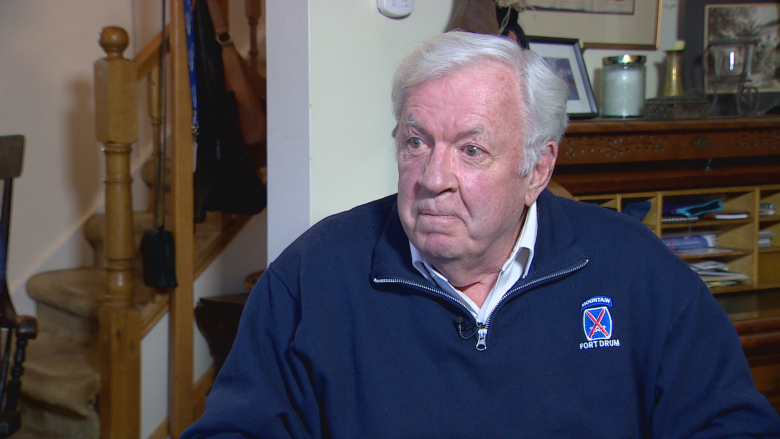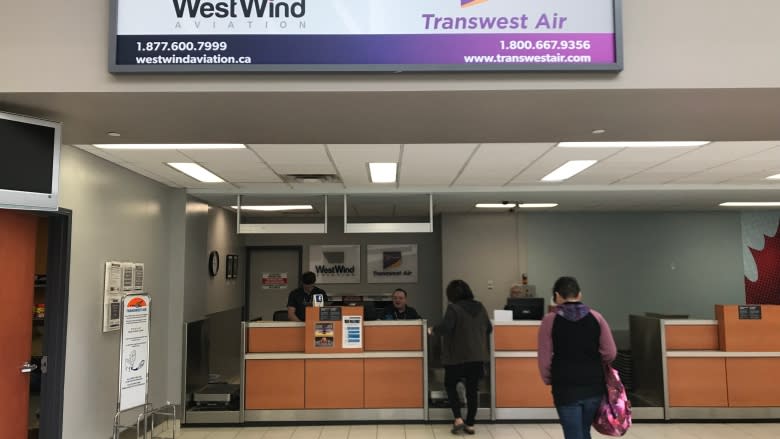Experts slam 'woefully inadequate' spray bottle used for de-icing by West Wind Aviation
The de-icing equipment West Wind Aviation had at the Fond-du-Lac airport last December was "seriously inadequate" according to Canadian aviation experts.
One of the Saskatoon-based airline's twin-turboprop planes, an ATR 42-320, crashed near the airport shortly after takeoff on the evening of Dec. 13.
Nine passengers were seriously injured and one died in hospital two weeks after the crash.
West Wind staff did not de-ice the plane before takeoff, even though there was ice on the plane, the Transportation Safety Board of Canada (TSB) revealed earlier this week.
During a post-crash inspection, the TSB photographed the de-icing equipment West Wind had at the airport: two ladders resting near refrigerators and a freezer, a hand-held spray bottle with electric blanket and wand, and a container of de-icing fluid.
"Well that's seriously inadequate," said Jock Williams, a former Transport Canada official and retired air force fighter pilot.
"Have you ever gone into Pearson [International Airport in Toronto] or Montreal or Ottawa and seen the de-icing equipment? [It's] effectively a fire hose on a gooseneck arrangement, and a guy sits up there and sprays gallons and gallons of de-icing fluid."
Greg McConnell, a former veteran Transport Canada inspector for 25 years, agreed the equipment in Fond-du-Lac was "woefully inadequate."
"The ATR 42 is an airline transport category aircraft and it requires de-icing trucks and extensive dicing equipment, certainly not garden variety spray bottles," he said.
CBC Saskatoon reached out to West Wind Aviation for an interview Wednesday. The company provided a written statement.
"West Wind Aviation continues to remember those affected by the aircraft incident," stated the company. "We continue to work with authorities including the Transportation Safety Board accident investigators, as well as Transport
Canada."
'Deeper problems'
The company's air operator certificate, which permits it to fly, remains suspended by Transport Canada more than four months after the crash, despite the company's submission of a corrective plan to Transport Canada.
"To date, the company's corrective action has not fully addressed the department's safety concerns," a spokesperson for Transport Canada said last month. "Transport Canada ... will only reinstate the company's certificate when the company demonstrates compliance with aviation safety regulations."
McConnell said that a four-month period is "a little bit unusual."
"Obviously it points to there being deeper problems," he said.
'They knew very well what the rule was'
The TSB said the turboprop destined for Stoney Rapids on Dec. 13 still had residual ice from its earlier flight to Fond-du-Lac.
"By law, if there is any residual ice sitting on an aircraft, you have to use de-icing and later anti-icing equipment," said Williams.
"They knew very well what the rule was with regard to de-icing and anti-icing and if they flagrantly did not carry out the actions in according with the rule, wouldn't you keep their certificate back?"
Even if West Wind had used the de-icing equipment it had, however, "they may not have gotten all of the ice that continued to adhere to the aircraft," said McConnell.
The TSB's final investigation report will look at whether West Wind's de-icing equipment was adequate and why it was not used that day.
That report could take months to complete.
Lawsuit at odds with TSB findings
Seven people, including passengers who survived that fateful flight, have filed a class-action lawsuit against West Wind and its majority owner, Athabasca Basin Development Limited Partnership, claiming the airline was negligent in preparing for and conducting the flight.
Among the claims laid out by Regina-based Merchant Law Group LLP is that the runway was "not properly de-iced, not properly lit, not properly kept up and without airplane de-icing equipment."
"We also know the de-icing issue ... is a very significant issue," lawyer Tony Merchant told CBC News on Wednesday. "The failure regarding de-icing is a complicated matter where de-icing was not performed and the causes of that not being performed reaches to more than one defendant."
The TSB's findings raise questions about some of the lawsuit's claims.
Merchant alleges the plane was "overloaded" with passengers and freight. But the TSB said the plane's takeoff weight was "below the maximum structural takeoff weight and the centre of gravity was within limits."
Merchant did not address that discrepancy when asked by CBC News.
The lawsuit also alleges that West Wind was employing "a pilot prone to error," while the TSB said "the captain and first officer were certified and qualified for the flight in accordance with existing regulations."
The lawsuit recently added another of West Wind's owners, Prince Albert First Nations Development Ltd., as a defendant.



